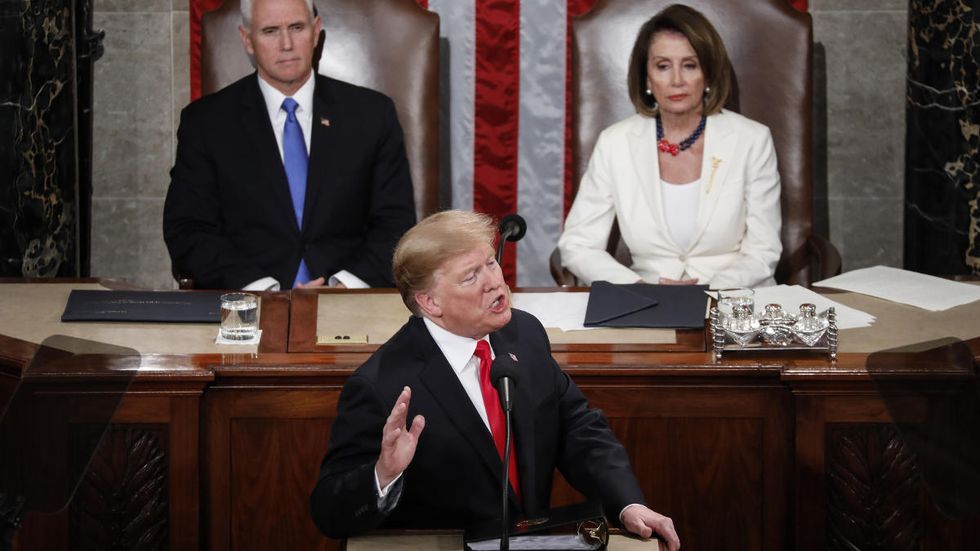
© 2024 Blaze Media LLC. All rights reserved.
President Trump's second State of the Union address was intended to lay out a legislative agenda for divided government. Knowing that the House of Representatives is under Speaker Nancy Pelosi's control, Trump attempted to strike a unifying and bipartisan tone and invited Democrats to work with him to benefit the country.
"The agenda I will lay out this evening is not a Republican agenda or Democrat agenda, it is the agenda of the American people," Trump said. He referenced broad campaign promises he claimed both Republicans and Democrats have made — implying that under divided government these are the deals Congress can make to move the country forward.
"Many of us have campaigned on the same core promises, to defend American jobs and demand fair trade for American workers, to rebuild and revitalize our nation's infrastructure, to reduce the price of health care and prescription drugs, to create an immigration system that is safe, lawful, modern, and secure, and to pursue a foreign policy that puts America's interests first," Trump said. "There is a new opportunity in American politics, if only we have the courage together to seize it."
Here are the big policies Trump proposed.
1) Immigration
After touting the successes of his administration over the last two years in growing the economy and the bipartisan work of Congress to pass prison reform and make the Department of Veterans' Affairs more accountable, Trump addressed the imminent problem facing Congress: how to strike a deal to fund border security and avert another government shutdown on February 15.
"Now, Republicans and Democrats must join forces again to confront an urgent national crisis," Trump said. "Congress has 10 days left to pass a bill that will fund our government, protect our homeland, and secure are very dangerous southern border."
Trump made the case against illegal immigrants in moral terms. He called on Congress to put "ruthless coyotes, cartels, drug dealers, and human traffickers out of business," a line that Democrats refused to clap for and 2020 presidential candidate Sen. Kamala Harris, D-Calif., actually shook her head at.
"This is a moral issue," Trump said. "The lawless state of our southern border is a threat to the safety, security, and financial well-being of all Americans. We have a moral duty to create an immigration system that protects the lives and jobs of our citizens. This includes our obligation to the millions of immigrants living here today who follow the rules and respected our laws."
Trump called on Congress to pass his proposal for $5.7 billion to build a "steel barrier system" and additional funding for technology, personnel, and humanitarian aid to address the border crisis. His compromise also includes extending DACA amnesty and the Temporary Protected Status (TPS) program for three years — a compromise Democrats have already rejected.
Bipartisan committees in the House and Senate are working to craft a deal that Trump will sign. What conservatives need to demand in any border security deal is the removal of legal incentives inviting illegal immigration. Amnesty or DACA must not be the focus of a bipartisan immigration deal. Physical barriers, whether a wall or a fence, will not work if illegal immigrants continue to abuse U.S. asylum laws and catch-and-release policies.
2) Trade
Trump returned to one of his favorite topics, touting the $250 billion in tariffs he has levied on Chinese goods and declaring that the U.S. and China must come to a trade deal that includes "real, structural change to end unfair trade practices, reduce our chronic trade deficit, and protect American jobs." The president plans to meet with Chinese President Xi Jinping soon, but the details of this meeting have not been announced.
For policies at home, Trump called on Congress to pass the U.S.-Mexico-Canada Agreement (USMCA), the North American trade deal negotiated by the president's administration that will replace NAFTA. A Heritage Foundation analysis of the deal gave it a mixed review, finding that several provisions brought down trade barriers and modernized digital trade, while in other areas, regulatory barriers on automobile trade were increased — including a minimum wage requirement and labor provisions that tilt left with controversial sexual orientation and gender identity (SOGI) provisions. It is not likely that the Democratic House will pass this trade deal.
Trump also called for Congress to take up the Reciprocal Trade Act, "so that if another country places an unfair tariff on an American product, we can charge them the exact same tariff on the same product that they sell to us." The bill, introduced by Rep. Sean Duffy, R-Wisc., would expand the president's authority to impose new tariffs and import restrictions unilaterally. Conservatives may have reasonable disagreement on the effectiveness of tariffs, but Congress should not be delegating its lawmaking authority to the president. This is a separation of powers issue. Tariffs, which are tax increases, should be debated and passed by Congress, not imposed unilaterally by the executive branch.
3) Infrastructure
President Trump repeated his call for Congress to pass an infrastructure bill.
"I know that Congress is eager to pass an infrastructure bill — and I am eager to work with you on legislation to deliver new and important infrastructure investment, including investments in the cutting-edge industries of the future," Trump said.
When Republicans controlled Congress, Trump proposed a $1.5 trillion infrastructure plan, claiming it would only cost the federal government $200 billion and arguing that the rest of the money would come from state spending and public-private partnerships. It was a bad idea then and remains so. It would drive up the debt and empower Washington D.C. to make infrastructure decisions for local communities. While Trump's plan called for removing regulations and red tape that have stalled infrastructure projects in the past, he ought to go further by devolving authority to the states and letting each state decide for itself how to fund and build infrastructure.
#mc_embed_signup{background:#fff; clear:left; font:14px;}
/* Add your own MailChimp form style overrides in your site stylesheet or in this style block.
We recommend moving this block and the preceding CSS link to the HEAD of your HTML file. */
4) Health care
Touching on health care, Trump called on Republicans and Democrats to work together to reduce drug prices and have hospitals and insurance companies post prices to be transparent with patients who are facing these costs. Trump also called for continued protections for people with pre-existing conditions.
The best way to make prescriptions more affordable is to reform the Food and Drug administration's approval process. The burdensome regulations benefit large pharmaceutical companies that can afford to navigate the red tape and lock out smaller companies that don't have the resources to get their lifesaving cures past government regulators. The costs to invent new drugs are staggering. Congress should also remove regulations that keep certain drugs from being sold over the counter, so people can pay out of pocket for the medications they need without going through an insurance company.
Price transparency is a commonsense reform that helps consumers know what they'll have to pay for medical procedures and drugs before they buy them. When consumers know the price for services rendered, they can shop around for the best deal, which would foster competition and encourage health care providers to lower prices.
On pre-existing conditions, Trump and the Republican Party have made the mistake of accepting the Left's premise that the only way to help people with pre-existing conditions is by forcing insurance companies to insure them. This defeats the point of health insurance and drives up costs for everyone else.
Conservatives need to go big on pre-existing conditions. President Trump should have called on Congress to free up the market and make health status insurance legal as an alternative to our current system of health insurance.
Conservative Review senior editor Daniel Horowitz explained how it would work:
One specific area of insurance that the federal government should leave completely free of regulation is any idea to solve the problem of pre-existing conditions through the marketplace. One proposed solution is health status insurance, broadly popularized by University of Chicago Professor John Cochrane.These plans would work much like life insurance: Consumers purchase an insurance plan to cover potential changes in their “health status” that would otherwise jack up premiums or make it hard to purchase new coverage. Parents could take out plans for children before they join the workforce — or even unborn babies — at dirt cheap rates. Let’s say Tom and his family have health status insurance. Tom’s daughter develops asthma and his wife is diagnosed with high blood pressure. Their health insurance rates go up. But, health status insurance kicks in to pay the higher premiums. Alternatively, Tom would receive a lump sum payout to be managed in a trust-style account to directly pay the health care costs. He could purchase specific options or riders for varying health anomalies (diabetes, heart disease, cancer). The options are endless.
Health status insurance will encourage insurance companies to offer tailor-made health plans or multi-year contracts that will protect those who later develop chronic conditions. Health insurance will become portable and untethered to employment decisions, a change in health status, relocation, or young adults moving off their parent’s plan.
The current regulatory regime imposed by Obamacare to "protect" people with pre-existing conditions is causing health insurance premiums to go up every year. Health insurance is getting more expensive, not more affordable, and pre-existing conditions regulations are largely to blame.
5) Paid family leave entitlement
Returning to a a campaign promise championed by Ivanka Trump, President Trump called for the creation of a new paid family leave entitlement program.
"I am also proud to be the first president to include in my budget a plan for nationwide paid family leave — so that every new parent has the chance to bond with their newborn child," Trump said. His proposal was met with loud cheers, with Rep. Ann Wagner, R-Mo., yelling "Yes!" in approval.
Some conservatives support this policy on pro-family grounds, and Sen. Marco Rubio, R-Fla., has sponsored legislation to pay for this new entitlement by giving parents an option to put a portion of their Social Security benefits towards paternal leave. Though well-intentioned, the policy is a mistake. First, where in the Constitution's enumerated powers does Congress have the power to pay for paternal leave? Second, who actually believes future administrations will not create a separate funding mechanism for this program once Social Security's insolvency reaches critical mass? Third, it is not conservative to run up the national debt, and Republican hypocrisy on spending does not justify creating another irresponsible government program.
6) Abortion
After last week's abortion controversies featuring Democrats in New York and Virginia embracing late-term abortions right up to the point of birth, President Trump told his staff he wanted to speak against this infanticidal extremism during the State of the Union. And so he did:
There could be no greater contrast to the beautiful image of a mother holding her infant child than the chilling displays our nation saw in recent days. Lawmakers in New York cheered with delight upon the passage of legislation that would allow a baby to be ripped from the mother's womb moments before birth. These are living, feeling, beautiful babies who will never get the chance to share their love and dreams with the world. And then, we had the case of the governor of Virginia where he stated he would execute a baby after birth. To defend the dignity of every person, I am asking Congress to pass legislation to prohibit the late-term abortion of children who can feel pain in the mother's womb.
Trump is referring to the Pain-Capable Unborn Child Protection Act, a bill that would ban abortions after the 20th week of gestation, when scientific evidence suggests the unborn baby can feel pain. This bill passed the Republican-controlled House in 2017 and was defeated in the Senate in 2018.
It is good that Trump wants Congress to keep going on record with this bill to expose the extreme position of Democrats on killing babies. The president should also support an effort by Rep. Steve Scalise, R-La., to force a vote on the Born-Alive Abortion Survivors Protection Act in the House and support Nebraska Sen. Ben Sasse's identical legislation in the Senate. On Monday, Democrats blocked Sasse's bill, which would ban infanticide by requiring health care practitioners to provide medical care to a baby who survives an abortion attempt and is delivered. Trump should encourage Senate Majority Leader Mitch McConnell, R-Ky., to force a vote in the Senate and have Democrats go on record with their opposition to an infanticide ban.
The president should also throw his support behind a federal heartbeat bill, which would protect life from the moment of a baby’s first heartbeat. And he should refuse to sign spending legislation that continues federal funding for Planned Parenthood, the nation's largest abortion provider.
Want to leave a tip?
We answer to you. Help keep our content free of advertisers and big tech censorship by leaving a tip today.
Want to join the conversation?
Already a subscriber?
more stories
Sign up for the Blaze newsletter
By signing up, you agree to our Privacy Policy and Terms of Use, and agree to receive content that may sometimes include advertisements. You may opt out at any time.
© 2024 Blaze Media LLC. All rights reserved.
Get the stories that matter most delivered directly to your inbox.
By signing up, you agree to our Privacy Policy and Terms of Use, and agree to receive content that may sometimes include advertisements. You may opt out at any time.



